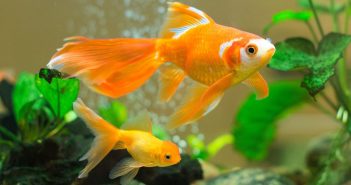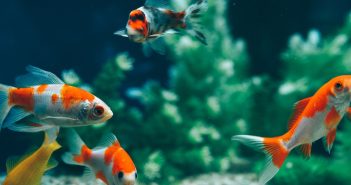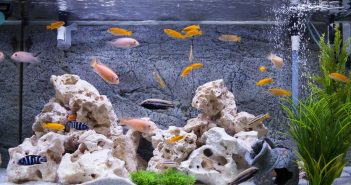The saltwater aquarium is not recommended for the beginner aquarist. It is however uncommon for beginner aquarists to even wish to start out with a saltwater aquarium instead of a freshwater aquarium. Setting up a basic saltwater aquarium is much more expensive than setting up a basic freshwater aquarium, and this means that it is typically the dedicated aquarist with years of freshwater experience that decides to spend the necessary money on a saltwater aquarium. The film “Finding Nemo” did however cause a saltwater boom, since a lot of people who saw the film wanted to keep a “Nemo fish”, i.e. a marine clownfish. Unfortunately, a lot of clownfishes ended up in the hands of unsuitable keepers that weren’t prepared to spend enough time, effort and money on their new pet.
If you are a comparatively inexperienced aquarist, you can still become a highly successful saltwater aquarist if you are prepared to spend a lot of time and energy on learning how a saltwater aquarium really works. Investing in suitable equipment and choosing some of the hardiest saltwater species will also greatly increase your chance of success. Do not hesitate to contact a saltwater aquarium club or a saltwater aquarium forum online and ask for advice and guidelines. Most saltwater aquarists are happy to share their knowledge with new aspiring saltwater aquarists.
One of the reasons why saltwater aquariums are more difficult to maintain than freshwater aquariums is that marine species tend to be much less tolerant to organic waste products and other forms of pollution. The enormous water mass that constitutes the ocean will rapidly dilute organic waste down to very low levels. Marine creatures are therefore not used to high levels of soluble waste and do not know how to cope. There are of course many freshwater species to be found that are also highly sensitive to organic waste and very difficult to keep in aquariums. Generally speaking, it is however much easier to find sturdy freshwater species since freshwater fish can live in small lakes and even puddles where the levels of organic waste can reach very high levels. Compared to marine species, these fishes will also typically be more suited to cope with all forms of change. In a smaller body of water, the temperature can for instance shift rapidly. Water hardiness and pH can also be affected by external factors. Trying to keep the environment in a freshwater aquarium as stable as possible is therefore good training if you plan on setting up a saltwater aquarium in the future.
The overall chemistry and ecology are also different in a saltwater aquarium, since the presence of salt affects chemical as well as biological processes. This is however not only a problem, it is also a possibility. You will for instance be able to use a protein skimmer in a saltwater aquarium; a very powerful form of filtration that will remove tiny organic waste particles before they begin to decompose.
Why do people want to keep saltwater aquariums in the first place? Well, the answer to these questions will naturally differ from aquarist to aquarist. Some aquarists are intrigued by the challenged. They started out with easy freshwater species, advanced to breeding freshwater species that hardly anyone can even keep alive in aquariums, and now they are looking for yet another challenge to face. Most aquarists are however keeping saltwater aquariums simply because they are fascinated by marine life forms. By keeping a saltwater aquarium, you will be able to select from a much wider range of species than before. Some of the most colourful fish species in the world are for instance marine species that must be kept in saltwater. Marine Angelfish, Damselfish and Clownfish are three examples of popular saltwater species that you will find in many marine aquariums. In addition to fish, you can for instance keep corals, anemones, marine crustaceans and weird and wonderful animals like jellyfish and octopuses. There are three main types of saltwater aquariums: FO, FWLR and Reef aquariums. The abbreviation FO stands for Fish Only while FWLR means Fish With Live Rock. Some aquarists will also keep more rare species in their aquariums, such as jellyfish, squids and octopus. The reef aquarium is generally considered to be the most complicated of the three main forms of aquarium. In a reef aquarium, the fish is not the centre of attention. Focus is instead placed on various forms of delicate corals. Corals have very particular requirements and will for instance need supreme water quality, intricate current patterns and extremely strong lights. When you arrange your saltwater aquarium, it is very important to you only select equipment and decorations suitable for saltwater use.
As mentioned earlier in this article, the chemistry in a saltwater aquarium differs from that found in a freshwater aquarium. An item that would be safe to use in a freshwater aquarium can therefore be unsuitable for a marine aquarium. You must also keep in mind that marine species tend to be extremely sensitive to pollution and changes in water chemistry. A piece of aquarium decoration that excretes a tiny amount of a dangerous compound can be enough to kill many marine life forms. Most saltwater aquarists rely on a combination of biological, chemical and mechanical filtration to keep the water quality up in the aquarium. By using quite a large aquarium, you will also make it easier to maintain a stable environment with low levels of soluble waste. A saltwater aquarium smaller than 55 gallons (200 litres) is considered quite difficult to keep. You can decrease the biolode by never over-feeding your aquarium inhabitants. Any uneaten food must naturally be removed from the water as soon as possible, and the same thing is true for dead organisms. It is also common for saltwater aquarists to introduce scavenging organisms to the aquarium since these animals will consume scraps of food before it starts to decay and pollute the water.

Allen Jesson writes for several sites including the UK’s leading retailer of aquariums and fish tanks and an excellent information resource for any owner of a salt water or fresh water aquarium or a tropical saltwater aquarium.



